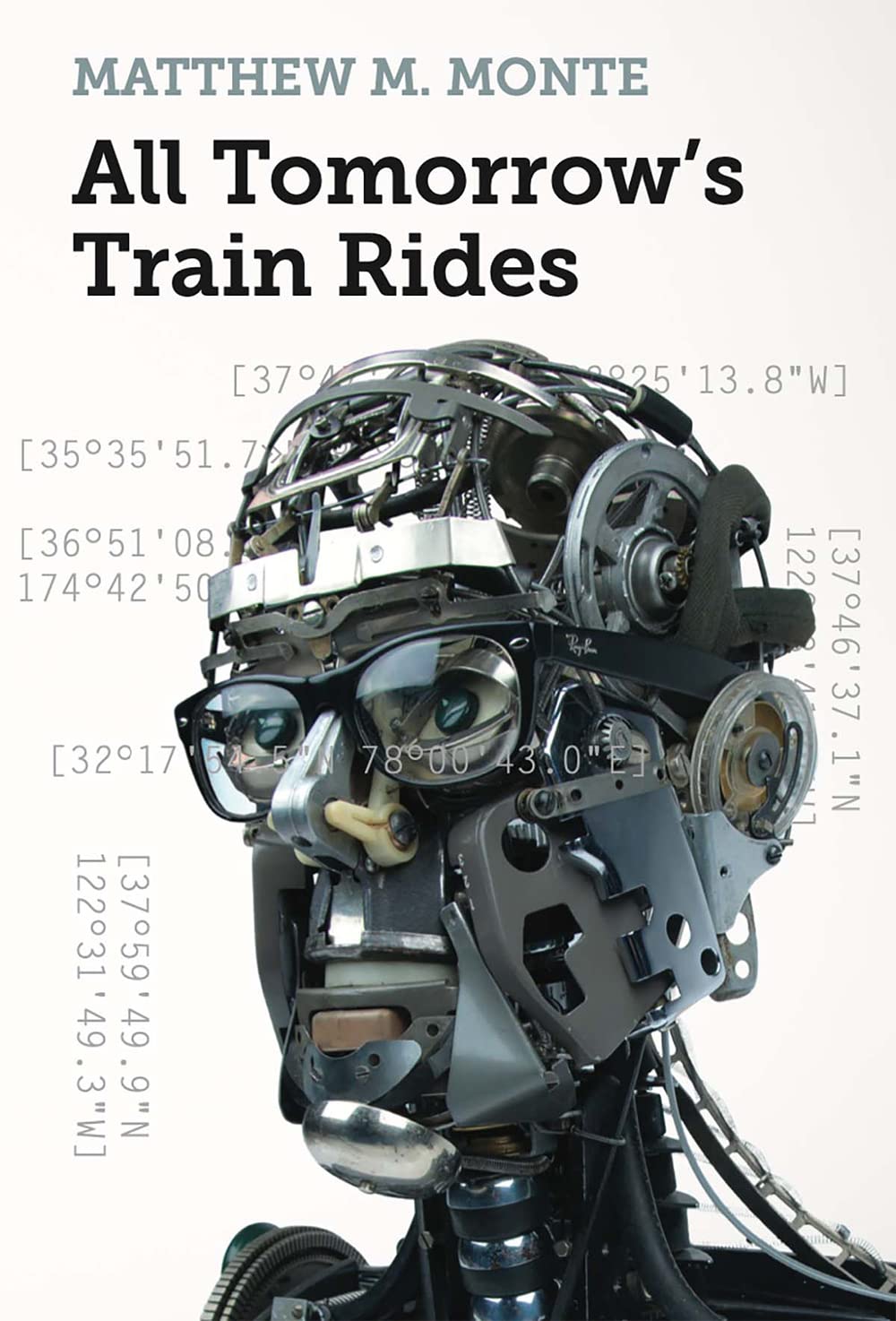Matthew M. Monte
Sixteen Rivers Press ($18)

by Lee Rossi
Yes, you hear an echo—the Velvet Underground playing “All Tomorrow’s Parties,” their great anthem to indulgence and dissolution. But though it offers less indulgence and more longing, less dissolution and more selflessness, All Tomorrow’s Train Rides—the second book by San Francisco writer Matthew M. Monte—is also great in its own unpredictable way.
A thoughtful, educated writer with associate’s degrees in insomnia, shoplifting, and alcoholism, Monte evidences a fascination with the work of other writers, figures as varied as Gary Snyder, Pierre Reverdy, and Miguel de Cervantes. In “Then I Read Wisława Szymborska” he reports on purchasing one of her books in Paris—at Shakespeare and Co. of course—and retreating to “the silent piano room”:
Where with you, I
Must say I
Feel only
Free
A love poem, isn’t it? Conversely, we find him hating on Jacques Derrida: “Form and Function Letter” mimics William Carlos Williams’s famous “This Is Just To Say,” except that Monte’s apology, which is more j’accuse than je t’aime, is directed at the fabulously indecipherable French philosopher. “This is just to say,” the poet begins, that he doesn’t “mind these synonyms / and metaphors and analogies,” but that he “very much mind[s] the meanings of these tightropes / between conventions, this / high-wire act we call language.” Language is perilous, the poet seems to admit, but “these lines save us / from drowning in your / soup of same.”
Clarity, precision—these are language’s gifts, and we abandon them at our peril. Consider Section V of the title poem, a sequence whose sections are spread throughout the book, in which Monte engages in dialogue with that consummate realist from the pages of Cervantes, Sancho Panza—transformed for the occasion into a Caltrain conductor. Who are these people on the train, Sancho wants to know, who “earn their keep from neither arms nor letters”? And the poet tells him: “the ore is silicon, a fool’s gold for sure. They create other minds from it. So that we don’t need to remember.” “No memory?” exclaims Sancho incredulously, issuing the poet “a private smile” for all the 400-thread-count cotton dress shirts: “Sancho knows / Clothes don’t make the man / Sees the suits for what they are / Variations on the fig leaf.”
Culture, he insists, is a charade, a theatre of the absurd.
Reality is what Monte wants, in all its clarity and precision—even when what it reveals is harsh or cruel:
Where the utility men
Cut back pine and manzanita
near the old quarry
They left behind a ragged cross-section of knotted wood
in the boot-print trail dust
That resisted the motoring blade and its bite
Monte’s passion for the real takes him into unexpected places. Many of these poems come with notes and annotations, some which are straightforward, and others which read like prose poems. Commenting on Don Quixote’s famous discourse on arms and letters, the poet references the GPS coordinates where Quixote spoke, and adds that “the windmills . . . / are spread along a / hill overlooking the Manchegan / plains, offering an excellent view of / things as they are, which are even / easier to see through the pages of / Don Quixote than the bullet train’s / blurring windowscape.” Once again, language and literature lead us closer to reality than our technological culture.
Latitude-longitude designations appear throughout the book, adding a dash of typographic esprít, but there are also other typographical flourishes—long strings of periods enclosed in brackets, for example. As a reader, I’m not sure how to receive these extra-literary excrescences; are they a sendup of erasure, a musical interpolation signaling rests, or a just a new-fangled jokiness? I suspect one can read them all three ways. But without a doubt, All Tomorrow’s Train Rides is a variorum of image and epithet where time and again we encounter this poet’s extraordinary verbal facility. Another poem in sequence, “[Latitude],” “[Longitude],” “[Degrees],” etc., is a list poem offering scores of subjects which contemporary poems do (and in some cases shouldn’t) embrace. Or consider these lines from “Three Sketches from Insomnia”:
That used-car salesman, memory,
never tells the true mileage or how
pumping the brakes never stops the night
. . . . . . . . . . . . . . . . . . . . . . . . . . . .
With histories like these, who needs enemies
For a writer who seems consumed with knowing exactly where he is, these lines signal a refreshing skepsis vis-à-vis the possibility of knowledge. It’s there, Monte suggests, but only if your search is dedicated and uncontaminated by self-will. I hear that sort of injunction in these lines from “Reconsider a Meadow”:
But it is states of not-mind
that reconsider a meadow
day after subtle day
above the snowy track and
shallow thaws in sheltered valleys.
Similarly, in “Write Livelihood,” he issues a slight re-formulation of the Buddhist imperative:
You read and say
how many things crystallized in your mind
and we know life found in found words is without parallel.
And though the world is not without its darkness
there is not
so much regret.
What do we find “in found words”? In All Tomorrow’s Train Rides, we find compassion, forgiveness, attention, and insight. We should be so fortunate in everything we read.
Rain Taxi Online Edition Spring 2024 | © Rain Taxi, Inc. 2024
